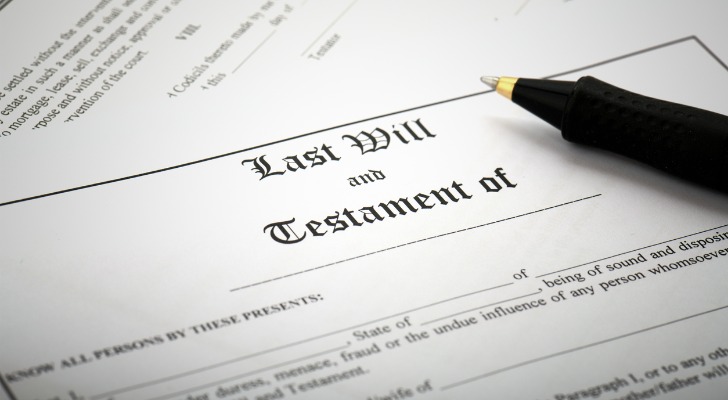
A will or a “last will and testament” is more than just a legal document – it’s a declaration of your wishes concerning the distribution of your assets and the care of your minor children after you pass away. In Texas, the absence of a will leaves your estate subject to state intestacy laws, which may distribute your assets in a way that doesn’t align with your personal wishes or relationships. While DIY estate planners in Texas can draft their own will online for less than $100 or even create a handwritten will for free, some may opt to work with an attorney and pay upward of $2,000 to have a will created by an expert.
A financial advisor with estate planning expertise can help you plan for the day when your loved ones and heirs inherit your assets. Find a fiduciary advisor today.
What Is a Will and Why Do You Need One?
In its simplest form, a will is your written plan for what happens to your assets and your minor children when you’re no longer here. This plan, when written down, is known as a “last will and testament.” The person making the will is referred to as the testator.
Having a will is like having a roadmap for your loved ones to follow. It gives explicit instructions on who gets what, which can help prevent misunderstandings and disputes when you’re not around to clarify your intentions.
If you die without a will in Texas, your estate falls under the control of state intestacy laws. These laws are like a one-size-fits-all solution that divides your assets without considering your personal relationships or desires. For example, if you’re survived by a spouse and children, not all assets automatically go to your spouse. Instead, they are split in specific ways. These impersonal rules could result in distributions that are completely opposite to what you would have wanted, underscoring the importance of having a legal will in Texas.
Do I Need an Attorney to Draft a Will in Texas?
In Texas, as in many jurisdictions, the law permits individuals to draft their own wills without the legal guidance of an attorney. According to Texas Estates Code, Section 251.051, a will must be in written form, signed by the testator or by another individual at their direction and in their presence, and attested by at least two credible witnesses over the age of 14.
This provision affirms the state’s acknowledgment that self-created wills, if they adhere to the specified statutes, are indeed legally enforceable.
However, you don’t even need an online service to create a legally-binding will in Texas. The state recognizes handwritten wills, also called holographic wills. These wills do not need to be signed in the presence of witnesses, which is generally required for typed or formally drafted wills.
However, for holographic wills to hold legal weight in Texas, several conditions must be met:
- They must be entirely handwritten by the testator
- The document must be dated
- It must be signed by the individual making the will
- The writing must clearly convey the testator’s intention to distribute their property after death
While holographic wills offer a more informal approach to estate planning, it is essential to meet all legal requirements to ensure the will’s enforceability.
Costs of Creating a Will in Texas

While handwriting your will is free, costs for creating other wills in Texas will vary based on the method and complexity of the estate. For those with a straightforward will, online platforms like Legal Zoom or Quicken WillMaker & Trust can help you create a basic will for less than $100. In contrast, individuals with more elaborate estates, might need the expertise of an attorney, which can result in a more significant financial commitment.
Attorney fees are influenced by several factors, including the lawyer’s expertise, the estate’s complexity and geographic location. Urban areas like Houston and Dallas may see fees that, while not capped, can reflect the higher cost of living, with more complex will creation sometimes costing upwards of $2,500 or perhaps even more. However, these fees can fluctuate widely, and attorneys in smaller towns may offer more affordable rates.
Requirements for Creating a Will in Texas

To establish a valid will in Texas, one must adhere to a set of basic legal requirements outlined by the Texas Estates Code:
- The testator must be a minimum of 18 years of age, a legally emancipated minor, married or serving in the armed forces.
- The testator must be of sound mind, understanding the nature of their property, the potential heirs and the act of making a will.
- The will must be a written document and signed by the testator or directed to be signed by another person in their presence.
- At least two credible witnesses over the age of 14 must observe the testator signing the will or acknowledging their signature. (This requirement doesn’t apply to holographic wills.)
- Witnesses must sign the will themselves, affirming their presence during its execution.
While notarization is not mandatory, it is advisable to notarize a will to make it “self-proving,” expediting the probate process.
Seeking professional legal advice can also help ensure the will meets all legal requirements and is effective. Lastly, regularly updating your will and consulting with an estate planning expert can provide clarity and peace of mind for the testator and their heirs.
Bottom Line
How much a will costs to create in Texas depends on the complexity of the person’s estate and whether they choose to hire an attorney to help them. While attorneys may charge thousands of dollars to handle the process, you can also draft a will in Texas using an online service for less than $100. Otherwise, you can create a handwritten or holographic will for free. Just keep in mind that a mistake could invalidate the will and subject your estate to state intestacy laws.
Estate Planning Tips
- If you’re just starting the estate planning process, there are several vital things you’ll need to do, including appointing a guardian for your minor children and taking stock of your assets. But that’s not everything. Here’s an estate planning checklist that can help you jumpstart this all-important process.
- You may also want to work with a financial advisor who offers estate planning services. Finding a financial advisor doesn’t have to be hard. SmartAsset’s free tool matches you with up to three vetted financial advisors who serve your area, and you can have a free introductory call with your advisor matches to decide which one you feel is right for you. If you’re ready to find an advisor who can help you achieve your financial goals, get started now.
Photo credit: ©iStock.com/Davel5957, ©iStock.com/roberthyrons, ©iStock.com/JLco – Julia Amaral